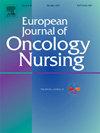Guided self-determination for patients with non-small cell lung cancer: Patients’ experiences of a nurse-led person-centred intervention
IF 2.7
3区 医学
Q1 NURSING
引用次数: 0
Abstract
Purpose
Guided self-determination is an empowering person-centred approach that has proven useful in empowering different patient groups but has not yet been tested in lung cancer patients. The purpose of the study was to examine how patients with stage III non-small cell lung cancer in concomitant chemoradiotherapy could benefit from a guided self-determination course.
Methods
A prospective intervention study with both quantitative and qualitative data. Patients (n = 20) were offered four guided self-determination conversations with a nurse. Symptoms and quality of life were measured through questionnaires and semi-structured interviews elicited thirteen patients’ experiences. Thematic analysis was conducted, and the Consolidated Criteria for Mixed Method Research was used for reporting.
Results
No difference in quality of life were found but significant worsening of pain, dyspnea, diarrhoea and dysphagia. Six themes were generated describing that in a new, uncertain and lonely situation with a life-threatening disease, the patients appreciated a respectful relationship with a nurse, and conversations with the nurse became a lifeline. Some patients felt increasingly empowered through new insights, while others felt that it became too intimate.
Conclusion
When patients with a serious disease can draw on nurses’ knowledge and experience, they are empowered to manage everyday life. Some patients need supportive and reflective conversations, while others benefit from concrete problem-solving objectives.
指导非小细胞肺癌患者的自我决定:护士主导的以人为中心的干预的患者经验。
目的:指导自决是一种以人为中心的赋权方法,已被证明在赋权不同患者群体方面是有用的,但尚未在肺癌患者中进行测试。该研究的目的是研究伴随放化疗的III期非小细胞肺癌患者如何从指导的自我决定过程中获益。方法:采用定量和定性相结合的前瞻性干预研究。患者(n = 20)与一名护士进行了四次有指导的自我决定对话。通过问卷调查和半结构化访谈对13名患者的经历进行了症状和生活质量的测量。进行了专题分析,并使用混合方法研究综合标准进行报告。结果:两组患者的生活质量无显著差异,但疼痛、呼吸困难、腹泻和吞咽困难明显加重。产生了六个主题,描述了在一个新的、不确定的、孤独的、危及生命的疾病的情况下,病人感激与护士的尊重关系,与护士的对话成为生命线。一些病人通过新的见解感到越来越有力量,而另一些人则觉得它变得太亲密了。结论:当重症患者可以利用护士的知识和经验时,他们就有能力管理日常生活。一些患者需要支持性和反思性的对话,而另一些患者则受益于具体的解决问题的目标。
本文章由计算机程序翻译,如有差异,请以英文原文为准。
求助全文
约1分钟内获得全文
求助全文
来源期刊
CiteScore
4.40
自引率
3.60%
发文量
109
审稿时长
57 days
期刊介绍:
The European Journal of Oncology Nursing is an international journal which publishes research of direct relevance to patient care, nurse education, management and policy development. EJON is proud to be the official journal of the European Oncology Nursing Society.
The journal publishes the following types of papers:
• Original research articles
• Review articles

 求助内容:
求助内容: 应助结果提醒方式:
应助结果提醒方式:


